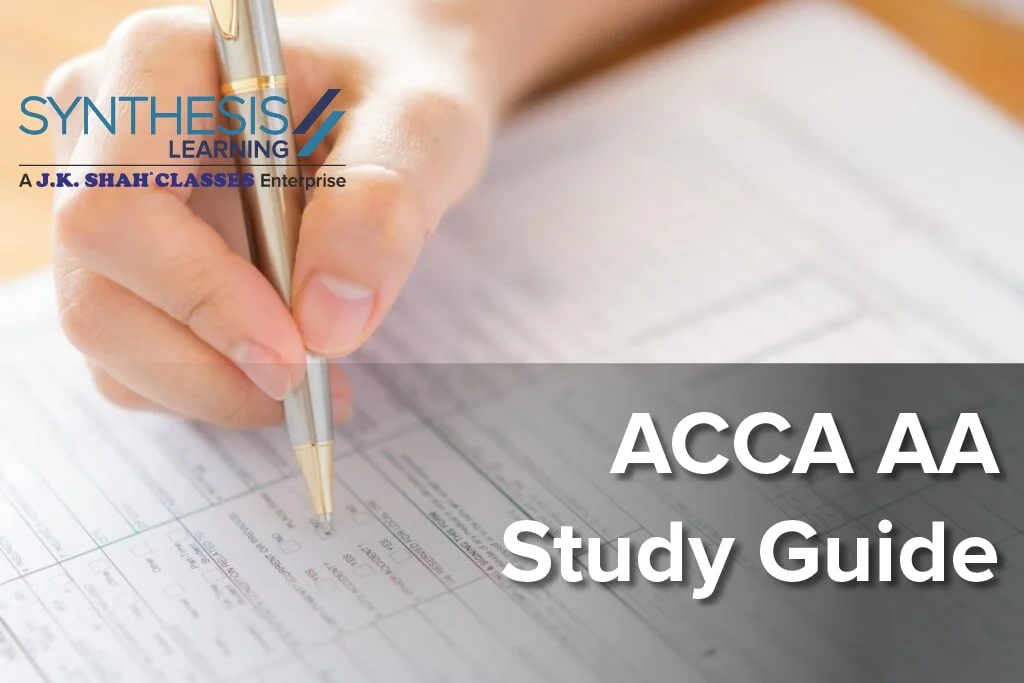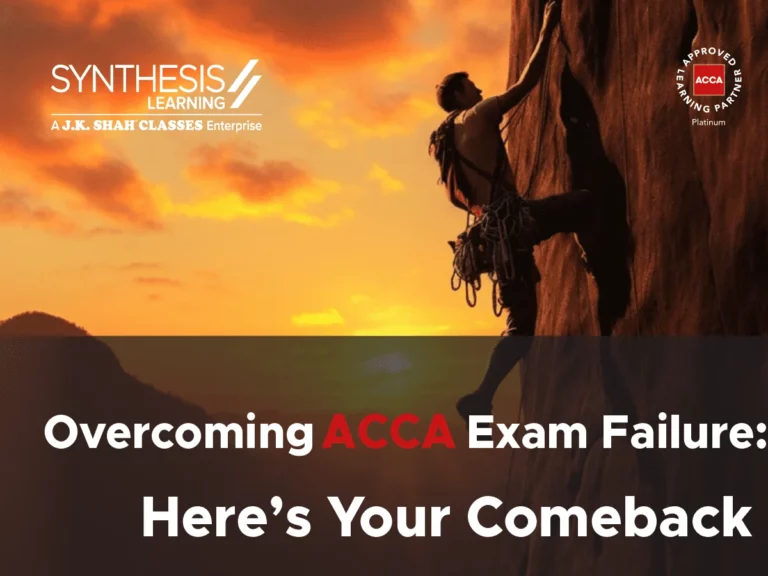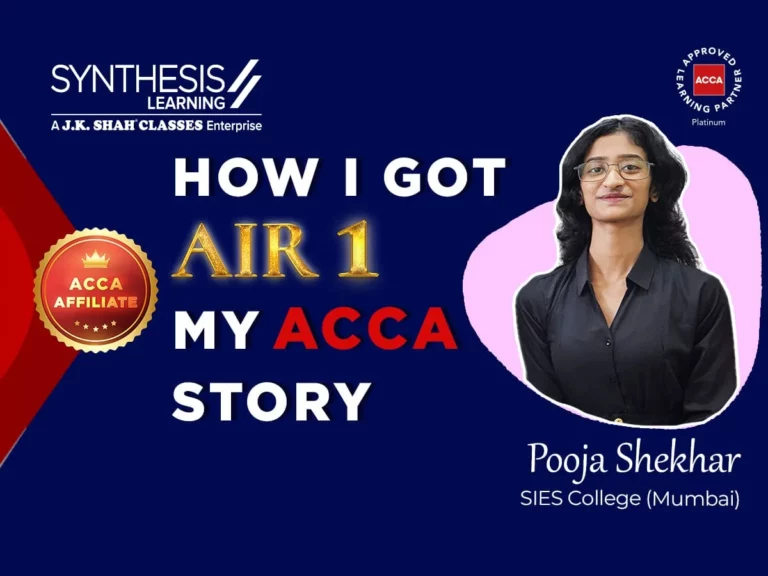DECODING THE SUBJECT
The ACCA Audit & Assurance or ACCA AA course helps you develop the knowledge and understanding of the process of carrying out the assurance engagement and its application in the context of the professional regulatory framework.
Being an exam in the skills level, ACCA AA can be attempted during any of the four exam sessions throughout the year – March, June, September, or December.
Table Of Contents
ACCA AA SYLLABUS
ACCA AA PAPER PATTERN
ACCA AA PASSING TRENDS
SOURCES OF CONTENT
STUDYING METHODOLOGY
HOW TO PLAN ACCA AA MOCK EXAMS
THINGS TO REMEMBER WHILE WRITING THE EXAM
EXAMINER’S EXPECTATIONS
ACCA AA SYLLABUS
It is the primary responsibility of the directors to prepare the financial statements of the entity.
An auditor is expected to evaluate the truthfulness and provide an opinion on these financial statements in an Independent Auditor’s Report using professional skepticism.
In other words, for the users (mainly shareholders) to rely on the financial statements, the auditor gives an opinion whether these financial statements of the entity prepared by the directors are true and fair in all material respects.
The syllabus is designed in a way to ensure the basic knowledge required by an auditor in auditing the financials of the entity using the International Standard on Auditing (ISA) and the International Standard on Quality Control (ISQC) is covered. Here is the detailed syllabus-
 A. Audit framework and regulation
A. Audit framework and regulation
- Introduction to assurance
- Rules and regulation
- Corporate governance
- Ethics and acceptance
 B. Planning and risk assessment
B. Planning and risk assessment
- Audit Risk
- Planning (Audit Strategy and Audit Plan)
 C. Internal control
C. Internal control
- Systems and controls
- Internal audit
 D. Audit evidence
D. Audit evidence
- Audit Evidence
- Procedures
 E. Review and reporting
E. Review and reporting
- Completion and review
- Reporting
 F. ISAs & FR revision
F. ISAs & FR revision
- Summary of key ISAs
- Financial reporting revision
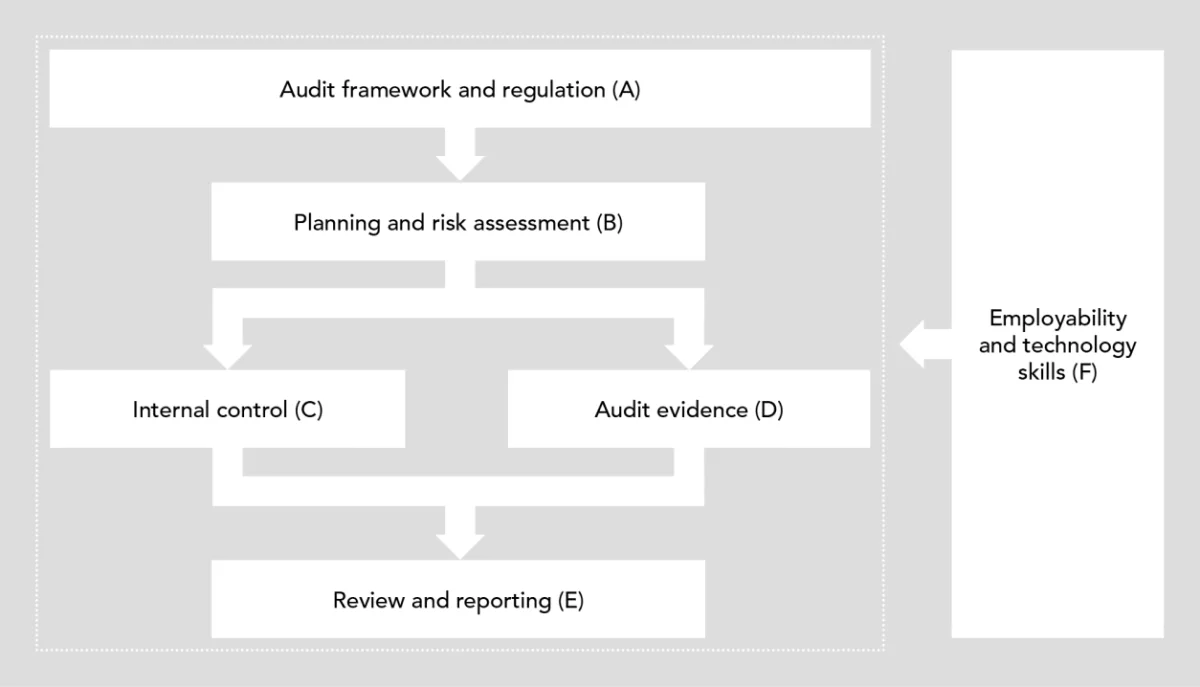
Hack: It is advisable to start with Part A: Audit framework and Regulation to understand the basics of the subject and then go ahead with Part B: Planning and risk assessment, make sure you spend enough time on Part B and solve all questions as there is a very high probability of it being tested.
You can then continue with Part C: Internal control and Part D: Audit evidence, as this part covers a lot of important topics in detail, it shall consume a good amount of time.
Part E: Review and reporting act as a conclusion and therefore should be covered after Part C. It is interesting, important, and less time-consuming. After you have completed all the topics with solving all case studies, you can spend some time reading Part F: ISAs & FR revision
Important note: It is advisable to give an audit and assurance (AA) exam after you have attempted the financial reporting (FR) examination. Knowledge of your FR paper will be helpful to clear your AA examination.
ACCA AA PAPER PATTERN
The 100-marks ACCA AA exam paper has been designed to ensure that all the different areas of the syllabus are covered adequately. Following are the various sections and question types that you can expect-
| ACCA Audit and Assurance (100 Marks) | ||
|---|---|---|
| Section A (30 marks) | Section B (70 marks) | |
| 3 case studies * 5 OTQ’s in each case study * 2 marks each | 3 Constructed response questions 1 question * 30 marks 2 question * 20 marks |
|
Please note, the paper pattern is different from all the other Applied Skills examinations.
As this is a theory paper, very few calculative or numerical questions are expected.
ACCA AA PASSING TRENDS
You are expected to score 50/100 to pass this examination. This is easily manageable with a clear understanding of the concepts, good practice of the questions, and a positive attitude. The pass rates of ACCA AA paper across the globe are roughly between 35%-45% for most attempts.
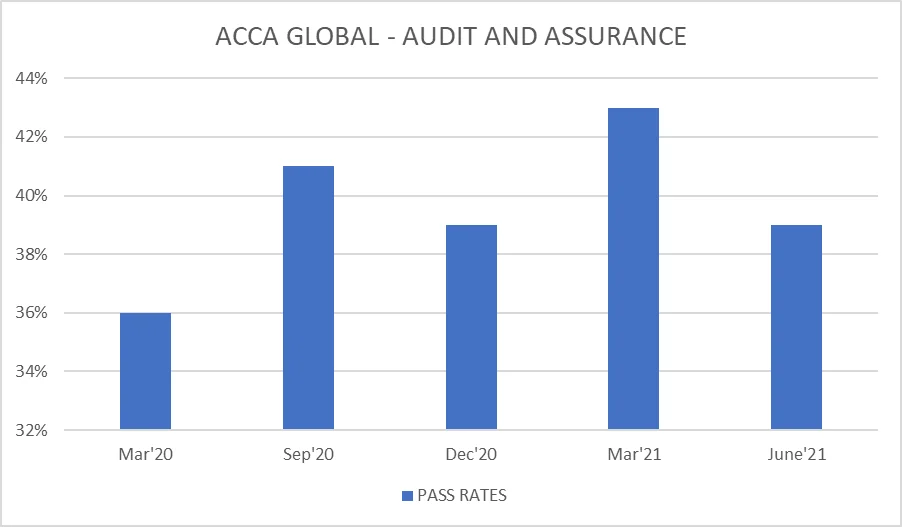
SOURCES OF CONTENT
You need to primarily refer to these two content sources for your preparations –
- The Study Text – for conceptual understanding
- The Practice/Exam Kit – for practice questions
There are only two ACCA-approved content providers that you should consider, namely, Kaplan Publishing and BPP Learning Media. Apart from this, you can also refer to the technical articles published by ACCA on different topics. You can use this link to refer to the articles.
Download our curated express notes for ACCA AA here
STUDYING METHODOLOGY
- Commence preparations with the Study Text and go through all the concepts in absolute detail. Understand the requirements of ISAs. Thereafter, attempt all questions from the Practice Kit to get more clarity and a deeper understanding of how to approach this part of the paper.
- The right language is very important in this paper. Learning to be crisp and yet ensuring you do not miss out on any details is an art you need to master with time. Choosing the right vocabulary from the ‘Audit Syllabus’ will go a long way in helping you build your score. The best way to practice this art is to read the answers from the Practice Kit enough times, till you have internalized the communication style for this paper.
- This is a complete theory paper so you must have very good practice of typing your answers. You may use the constructed response ‘blank workspace’ provided by the ACCA after logging in to the Practise Platform to get a hold of the CBE environment. You can follow through this link.
- This paper will also include a few direct or straightforward questions testing your understanding of concepts. Although there is no exhaustive list of the straight questions that can be tested, it is advisable to learn all-important direct questions to boost your marks.
- When solving the constructed response questions from the practice kit, it is useful to go through the key answer tips, tutor’s top tips, tutorial notes, and examiner’s comments to understand what the common mistakes made by students are and how you can deliver a better answer.
HOW TO PLAN ACCA AA MOCK EXAMS
Attempting enough mock exams are a must! Going without solving mocks is like a soldier without a weapon.
The examination is now conducted using the CBE platform, it is truly important to write at least 2-3 mocks to get a good idea of how the final examination would be and to get used to the CBE environment.
You can log in to the ACCA ‘Practice Platform’ for solving mocks using the following link.
Hack: One day before the examination, invest all your time in revising what you have studied so far. Do not try to study any new concept or solve any new case study. Skim through the study text and practice kit. Focus on memorizing the important concepts, key learnings from the various case studies you have practiced & revising the key terms & terminologies that you shall use in your answers.
THINGS TO REMEMBER WHILE WRITING THE EXAM
While you have learned your syllabus well, it is very important to take note of a few important tips & tricks that will help you deal with your exam efficiently-
- Time Management: It is important to complete the paper on time. Traditionally, students have failed to manage this paper in the given time period. Remember, Time Management is the key to a success!
Time Management during the exam:
| PAPER | AA | TOTAL |
|---|---|---|
| Section A | 15 case study OTQ’s * 2.67 mins | 40 minutes |
| Section B | 2 questions (20 mark) * 40 mins each | 80 minutes |
| 1 question (30 mark) * 55 mins each | 55 minutes | |
| Final Check | 5 minutes | |
| TOTAL | 180 minutes |
- Do not stress or panic during the exam, stay calm write all you know. If you freak out, it is possible that you mess with other straightforward, manageable, and scoring questions.
- Do not leave any question unattempted
- For your OTQ’s there is always a 25% probability to get the answer right, place your bet and mark the option you believe is the closest to the answer.
- For constructed response questions there is no negative marking. So, based on your understanding of the concepts make sure you form an answer to every question asked.
- Be prepared to find a different and new style of questions, with patience and linking to the concepts of your syllabus you should be able to tackle them well.
- Better to start with Section A first, then Section B, and lastly Section C, i.e. FOLLOW THE ORDER!!! Do not spend too much time finding answers to questions you are not able to crack. Section C: make sure you show the workings and the solution wherever needed for the numerical questions. For theoretical questions write enough to earn marks. One healthy and valid point is worth 1 mark.
EXAMINER’S EXPECTATIONS
The ACCA publishes an Examiner’s Report for every attempt which gives an insight into the marking process, the common mistakes that students make during the exams, and other useful techniques to do well in your examination. You must go through the Examiner’s Reports to understand what the examiner is expecting from you. It will help you understand how students have failed to tackle different questions and how they could have performed better. It’s like learning from someone else’s mistakes. You can follow through this link to refer to a few of the examiner’s reports published by the ACCA
All the best 😊
Our expert tutors for ACCA Audit and Assurance (ACCA AA) have successfully coached thousands of ACCA aspirants with a phenomenal passing rate. Over 92% of our students that completed our full eLearning program passed their exams (92% was an average of all our qualification courses over the last 2 years at the time of writing). Join their club with our Platinum Rated ACCA Online Courses today! Book a demo.
Summary of all links
Technical articles published by ACCA
Blank workspace provided by the ACCA
Examiner’s reports published by the ACCA
